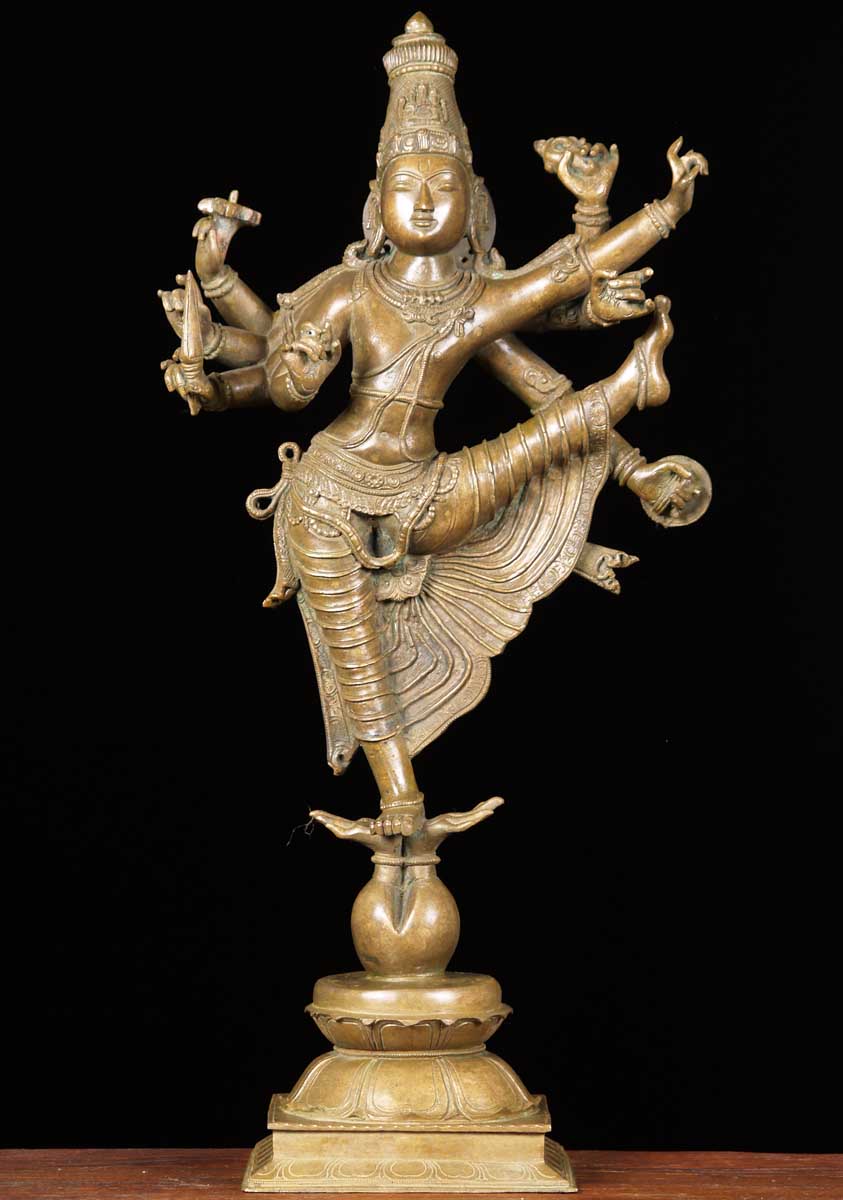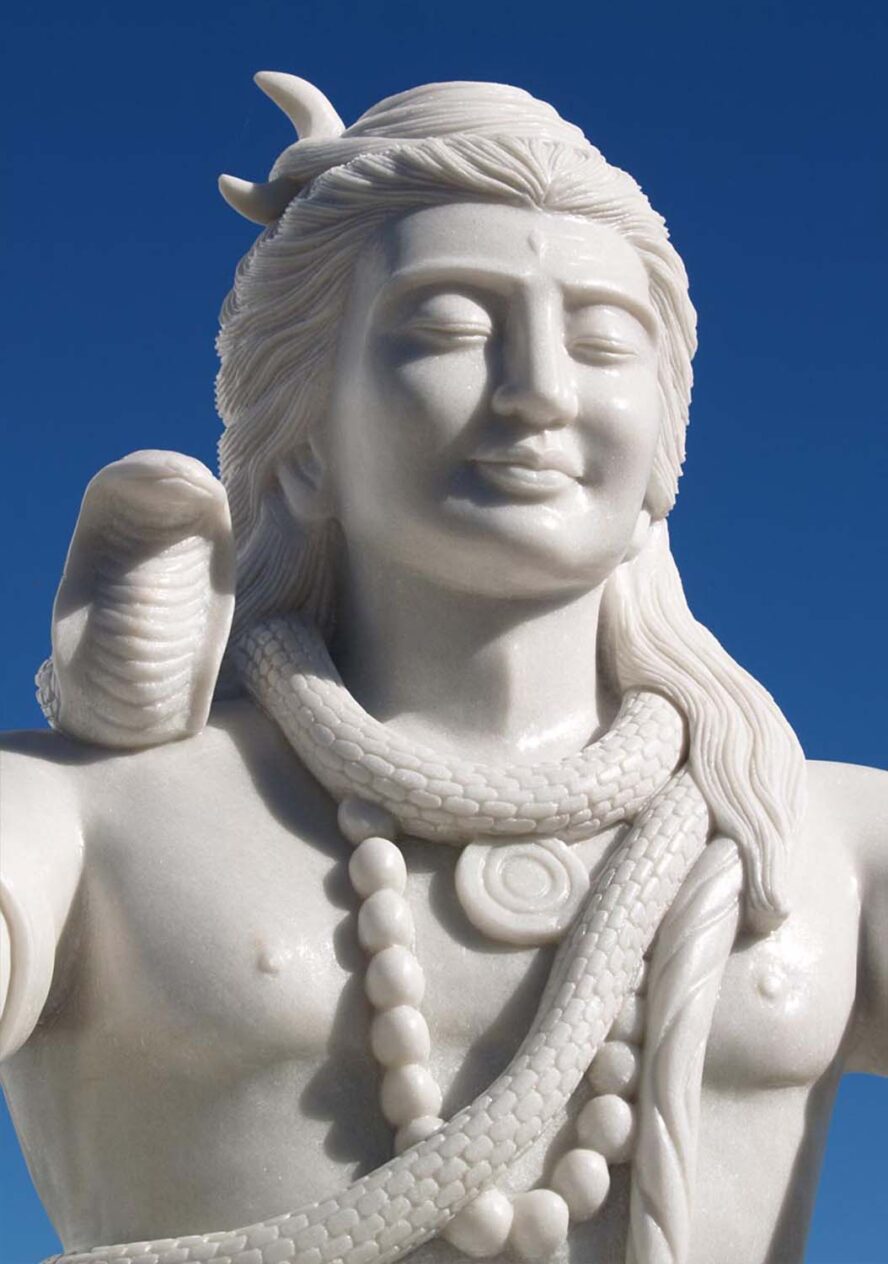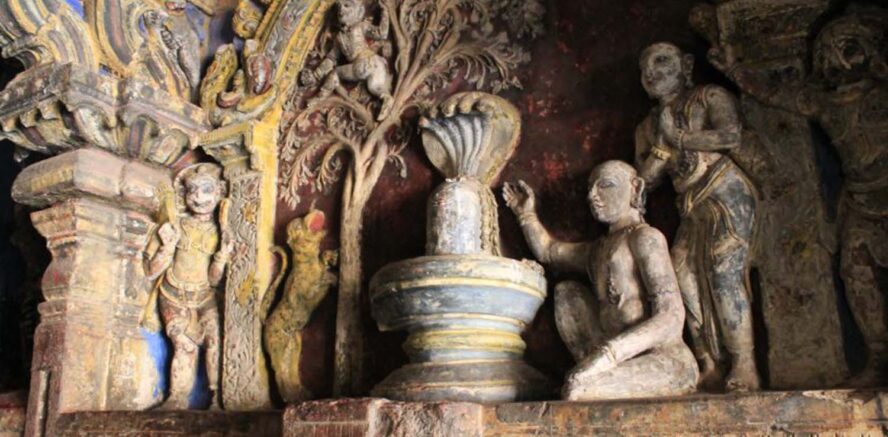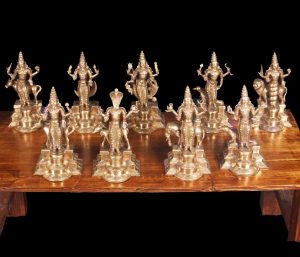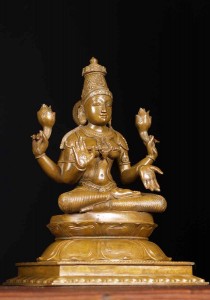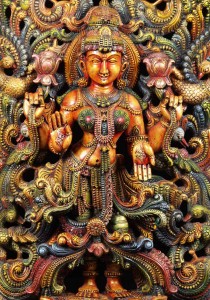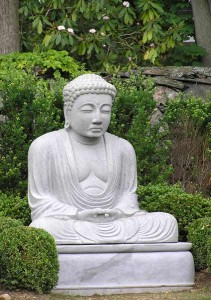Vishnu is a part of the trinity and plays the role of the creator. He has taken ten incarnations to save the planet and the good people from the hands of evils or demons. There are many mantras to please Lord Vishnu.
Vishnu’s preserving, restoring, and protecting powers have been manifested in the world in a series of ten earthly incarnations known as avatars. The avatars arrive either to prevent a great evil or to effect good upon the earth. Nine are said to have descended already: three in nonhuman form, one in hybrid form and five in human form. The most important are Rama, fearless upholder of the law of dharma and Krishna, youthful hero of the Bhagavad Gita Vishnu’s final avatar is expected to arrive at a time when the earth is at the end of its present cycle, with the purpose of destroying the world and subsequently recreating it.
Vaishnavites, one of the largest Hindu groups, are the devotees of Vishnu as Ishvara, the Supreme Being, worshipped in the forms of his manifestations or incarnations. Because of his pervasive presence, images as the focus of worship are of great importance, as are temple architecture and carving.
1. Mukti (Liberation) mantra:
This twelve letter mantra is also known as the liberation mantras as it is believed to relieve the person who is chanting this mantra from all the hardships of life.
“Om Namo Bhagavate Vasudevaya”
Meaning: I bow to the Lord who lives in the hearts of all.
2. Shree Vishnu Mantra:
It is otherwise known as the shaanta-kaaram mantra. It is one of the most powerful mantra used to praise Lord Vishnu and his incarnations, which helped to restore peace and happiness.
“shaanta-kaaram bhujaga-shayanam padma-naabham
suresham
vishwa-dhaaram gagana-sadrisham megha-varanam
shubhaangam.
lakshmi-kaantam kamala-nayanam yogi-bhi-dhyaana-
agamyam
vande vishnum bhava-bhaya-haram sarva-lokaika- naatham”
Meaning:
I sing praising the Lord Vishnu
Shaanta – He who has the peace
Kaaram- demeanor and visage
shayanam — He who sleeps and reposes
bhujaga– on the serpents
padma– He who has a lotus shaped
naabham– Navel
He who is the master and lord
Suresham– of all the gods
I pray to the Lord Vishnu.
dhaaram –He who holds the
vishwaa– universe in his hands.
sadrasham –He whose vision exceeds
gagana– beyond all the skies
varanam — He whose color and visage is
megha– changeable like the clouds
shubh– he who is filled with goodness
aangam– in every part of his body.
I sing praise to the Lord Vishnu.
kaantam — He who is the husband
lakshmi– of the goddess of wealth
He whose eyes (nayanam) are surreal
kamala– like a lotus flower
agamyam– he who yogis yearn to reach
dhyaana– through meditation
I sing praises (vande-) to the Lord Vishnu (-vishnum)
He who removes (-haram) all our fears (-bhaya)
bhava– due to our inborn nature
And he who is the master (-naatham) of the
entire (-sarva) universe and creation (-lokaika).
3. Narayana Mantra:
Simple, yet powerful mantra to please the preserver, Lord Vishnu.
“Om Namo Narayanaya“
Meaning: I bow before the Almighty.
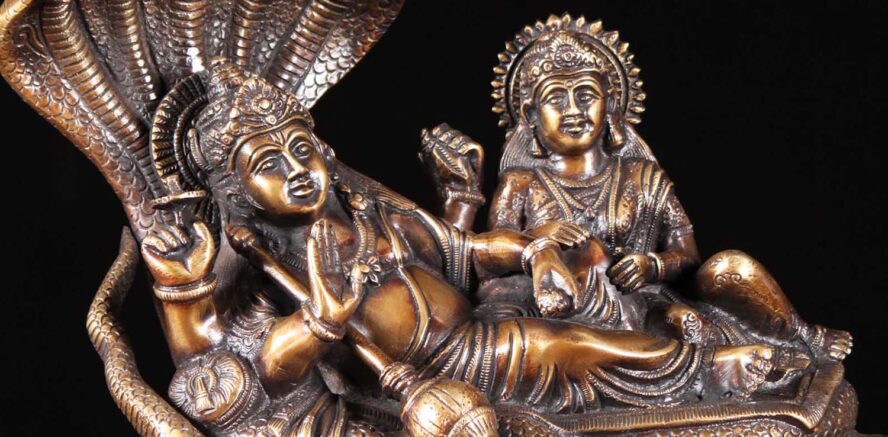
4. The Ultimate mantra:
This mantra depicts about the avatars of Lord Vishnu, He has taken to save the world from evils.
“Om shreem krishnaya shreem
shreem shreem govindaya gopalaya goloka
sundaraya sathyaya nithyaya paramathmane paraya
vykhanasaya vyrajamoorthaye
meghathmane shreem narasimhavapushe namah“
Chanting this mantra for 91 days ensures maximum protection for you.
5. Sloka on Sri Vishnu
“Kaayena Vaacaa Manase[a-I]ndriyairvaa
Buddhy[i]-Aatmanaa Vaa Prakrteh Svabhaavaat
Karomi Yad-Yat-Sakalam Parasmai
Naaraayannayeti Samarpayaami”
Meaning: Whatever actions I perform, by body, mind, senses or intellect. I surrender them at the feet of Sri Narayana.
6.
“Shuklam Baradharam Vishnum
Shukla-Ambara-Dharam Vissnnum Shashi-Varnnam Catur-Bhujam
Prasanna-Vadanam Dhyaayet Sarva-Vighno[a-U]pashaantaye”
Meaning: I Meditate on Sri Vishnu, Who is Wearing White Clothes, Who is All-Pervading, Who is Bright in Appearance like the Moon and who is Having Four Hands. He is having a Compassionate and Gracious Face, Let us meditate on Him to Ward of all impediments.
7. Vishnu Sahasranama:
This prayer contains the 108 names of the Lord Vishnu and is believed to relieve people from all sin and sufferings.
Om Vishnave Namah
Om Lakshmi Pathaye Namah
Om Krishnaya Namah
Om Vaikuntaaya Namah
Om Garuda Dhvajaya Namah
Om Parah Brahmane Namah
Om Jagannathaya Namah
Om Vaasudevaya Namah
Om Trivikramaya Namah
Om Dhydhyaanthakaaya Namah
Om Madhuribhave Namah
Om Dhaarshyavahaaya Namah
Om Sanaadhanaaya Namah
Om Narayanaya Namah
Om Padmanabhaya Namah
Om Hrishikeshaya Namah
Om Sudhapradhaya Namah
Om Haraye Namah
Om Pundarikakshaya Namah
Om Siddhidhikarthre Namah
Om Paraathparaya Namah
Om Vanamaline Namah
Om Yagnaroopaya Namah
Om Chakrapanye Namah
Om Gadhadhraya Namah
Om Upendraya Namah
Om Keshavaya Namah
Om Hamsaaya Namah
Om SamudraMadhanaya Namah
Om Haraye Namah
Om Govindaya Namah
Om Prahmajankaya Namah
Om KaitabasuraMardhanaya Namah
Om Sridharaya Namah
Om Kaamajakaaya Namah
Om Seshaya Namah
Om Chadhurbhujaya Namah
Om Paanchajanyadharaaya Namah
Om SriMathe Namah
Om Shaarangapanaye Namah
Om Janardhanaya Namah
Om Pitambharadharaya Namah
Om Devaya Namah
Om SuryaChandraVilochanaya Namah
Om MatsyaRoopaya Namah
Om Kurmathanave Namah
Om Krodharoopaya Namah
Om Nrukesarine Namah
Om Vaamanaaya Namah
Om Bhaargavaaya Namah
Om Raamaya Namah
Om Haline Namah
Om Kalkine Namah
Om Hayaananaaya Namah
Om Viswambaraya Namah
Om Simsumaaraya Namah
Om Srikharaaya Namah
Om Kapilaaya Namah
Om Dhruvaaya Namah
Om Dattatreyaya Namah
Om Achyutaya Namah
Om Anantaaya Namah
Om Mukundhaaya Namah
Om Dhidhivaamanaaya Namah
Om Dhanvantraye Namah
Om Srinivasaya Namah
Om Pradyumnaya Namah
Om Purushothamaya Namah
Om Srivathkausthubhadhraaya Namah
Om Muraradhaye Namah
Om Adhoshjaaya Namah
Om Rushabhaya Namah
Om MohanaroopaDharine Namah
Om Sangarshanaaya Namah
Om Prithave Namah
Om Sheerabdhisaayene Namah
Om Bhoodhathmane Namah
Om Anirudhaaya Namah
Om Bhakthavatsalaaya Namah
Om Naraaya Namah
Om GajendraVaradaaya Namah
Om Thridhamne Namah
Om Bhoothabhavanaaya Namah
Om Svetavaasdhavyaaya Namah
Om SuryamandalaMadhyakaaya Namah
Om SanakathiMunithyeyaaya Namah
Om Bhagavathe Namah
Om SankaraPriyaya Namah
Om Neelakanthaya Namah
Om Tharakaanthaaya Namah
Om Vedathmane Namah
Om Bhadhraayanaaya Namah
Om BhagirathiJanmaBhoomiPaadaPadmaaya Namah
Om Stham Prabhave Namah
Om Svabhave Namah
Om Vibhave Namah
Om KanakaShyamaaya Namah
Om Jagadhkaaranaaya Namah
Om Avyayaaya Namah
Om Buddhavadharaaya Namah
Om Shaanthathmane Namah
Om Krisoth Namah
Om Leelamaanusha Vigrahaaya Namah
Om Damodharaaya Namah
Om Viraataroopaaya Namah
Om Bhoodhabhavyabhavath Prabhave Namah
Om Aadi Devaaya Namah
Om Deva Devaaya Namah
Om Prahladha Paripalakhaya Namah
Om shree parama visnu devaya namaha
View All Our Mantras to Hindu Gods
including English and Sanskrit translations
| 10 Kali Mantras | 15 Saraswati Mantras | 4 Ganesha Mantras |
| 6 Murugan Mantras | 8 Krishna Mantras | 7 Hanuman Mantras |
| 3 Lakshmi Mantras | 8 Vishnu Mantras | 5 Shiva Mantras |

